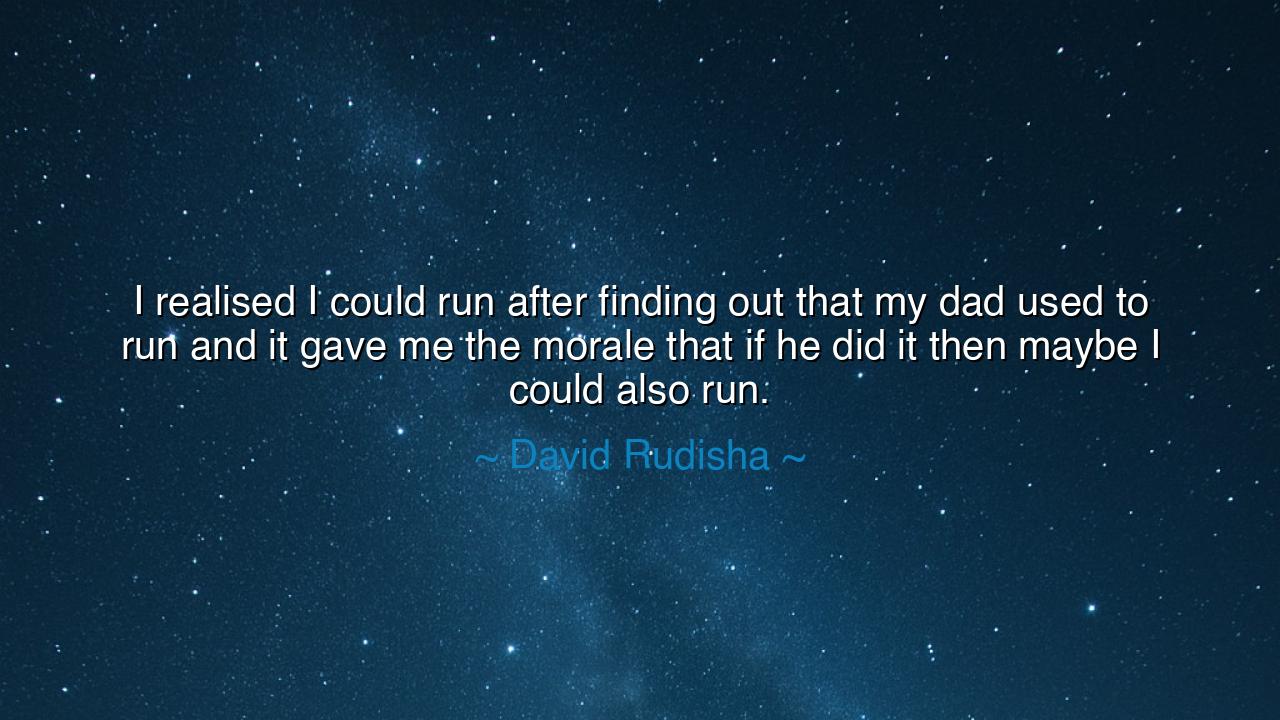
I realised I could run after finding out that my dad used to run
I realised I could run after finding out that my dad used to run and it gave me the morale that if he did it then maybe I could also run.






In the humble yet powerful words of David Rudisha, the great Kenyan runner, we find a truth that speaks to the very heart of inheritance and destiny: “I realised I could run after finding out that my dad used to run and it gave me the morale that if he did it then maybe I could also run.” These words carry more than the story of an athlete—they reveal the eternal thread that binds generations together. For within every child lies the echo of their ancestors, and within every achievement shines the reflection of those who came before. What Rudisha discovered was not merely his talent—it was his lineage, the quiet whisper of his father’s footsteps calling him onward across time and earth.
The origin of this quote arises from the soil of Kenya’s Rift Valley, where the wind itself seems to carry the rhythm of endurance. David Rudisha, the Olympic champion and world-record holder, was not born into privilege or abundance, but into the heritage of effort. His father, Daniel Rudisha, had been an Olympian before him—a runner who once carried the flag of his nation upon the same track. When David learned of this, something awoke within him. It was as if a hidden flame, long dormant, caught fire. He realized that greatness was not a distant dream belonging to others—it was written into his own blood. If his father could do it, so could he. And in that realization, he found the strength that would one day make him the fastest man alive over 800 meters.
This truth, though born in running, belongs to all of life. Every person is shaped by the unseen legacies of those who came before. Some inherit songs, some inherit struggles, and some inherit silence—but within all of us lives the possibility of continuation. Rudisha’s revelation is the awakening of moral inheritance—that the courage, the persistence, and the dreams of our ancestors are not lost, but sleeping within us, waiting to be remembered. The ancients understood this deeply. The Greeks spoke of arete, the excellence that flows through generations, urging each soul to surpass the deeds of their forebears. The Hebrews spoke of the fathers’ blessing, passed not through wealth but through example. The same spirit lives in Rudisha’s words, simple yet sacred: “If he did it, then maybe I can also run.”
Let us recall, too, the story of Alexander the Great, who wept as a boy when he heard of his father Philip’s victories, not from envy but from desire. “My father will leave me nothing to conquer,” he said. Yet this fire drove him to greatness. He did not see his father’s achievements as barriers, but as invitations. So it was with David Rudisha. His father’s footsteps did not intimidate him—they inspired him. He saw in his father not a giant to be feared, but a torchbearer whose flame he would carry farther. And in that spirit, every son, every daughter, every human heart must learn: our ancestors are not shadows behind us—they are lights before us.
But there is more still. The morale Rudisha speaks of is not pride—it is faith. To believe that we, too, can achieve what others have done is to trust in the shared strength of humanity. Too many walk through life believing they are alone, forgetting the roots that feed them. Yet when we look back—at a parent’s endurance, a grandparent’s sacrifice, a teacher’s patience—we find within ourselves the courage to move forward. Each act of greatness, however small, plants a seed in the generations to come. Thus, when we persevere, we are not only running for ourselves—we are running for those who will follow.
The lesson is clear and timeless: greatness is not born in isolation. It grows from example, from memory, from the courage of those who dared before us. When you doubt your strength, remember those whose lives have already proven what is possible. If they endured hardship, so can you. If they rose after failure, so must you. Their victories are not their own—they are invitations to you to continue the race. For the spirit of endurance is a living river, flowing from age to age, from heart to heart.
So, dear listener, take heed of Rudisha’s wisdom. Look back, not in regret, but in remembrance. Honor the footsteps that led you here—your parents, your teachers, your ancestors—and let their strength become your own. Whatever your path—be it running, creating, serving, or healing—remember that you do not begin at nothing. You are the continuation of something sacred, the living echo of those who loved, labored, and believed before you.
And when the day comes that you, too, pass from this world, may you leave behind not just memories, but morale—the quiet conviction in the hearts of those who follow you, whispering, “If they did it, then maybe I can also run.”






AAdministratorAdministrator
Welcome, honored guests. Please leave a comment, we will respond soon